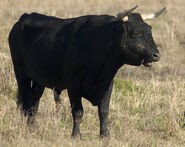| |||||
|
Motto: 「ᚲᛖᛏ ᚨᚾᛞᛖᚱ ᛖᛚᛋ ᛁᛇᛟᚲᛁᚱ」 "Ket ander els Isokir" "None other than Isokyria" | |||||
 Isokyria's controlled territory in dark green, claimed territory in light green. | |||||
| Capital |
| ||||
| Official languages |
English Isokyrian | ||||
| Recognised regional languages | Russian | ||||
| Ethnic groups |
84% Isokyrian 9% British-Isokyrian 5% Russian-Isokyrian 2% other | ||||
| Demonym | Isokyrian | ||||
| Government | Single-party Nororist state | ||||
| Eydis Stefanic | |||||
• President of the Isokyrian National Assembly |
Oskar Leifson | ||||
| Isokyrian National Assembly | |||||
| Independence from the United Kingdom | |||||
• Declared |
August 1, 1920 | ||||
• Recognized |
January 12, 1923 | ||||
• Current constitution |
January 1, 1938 | ||||
| Area | |||||
• |
249,796 km2 (96,447 sq mi) | ||||
| Population | |||||
• Estimate |
32,619,547 | ||||
| GDP (PPP) | 2016 estimate | ||||
• Total |
$1.885 trillion | ||||
• Per capita |
$65,209 | ||||
| Gini |
48.3 high | ||||
| HDI |
0.874 very high | ||||
| Currency | Isokyrian pound (ISP) (£) | ||||
| Time zone | UTC -1 | ||||
| Date format | yyyy-mm-dd | ||||
| Drives on the | left | ||||
| Internet TLD | .ik | ||||
| This article contains runic characters. Without proper rendering support, you may see question marks, boxes, or other symbols instead of runes. |
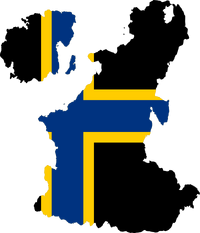 This article is part of a series on
Isokyria | |||||||
|---|---|---|---|---|---|---|---|
| Ideology | |||||||
| Nororism | |||||||
| Government | |||||||
| National Assembly | |||||||
| Isokyrian Nororist Party | |||||||
| Chairman of the Isokyrian Nororist Party | |||||||
| History | |||||||
| First Civil War | |||||||
| Republic of Isokyria | |||||||
| Second Civil War | |||||||
| 1938-1959 | |||||||
| 1959-1964 | |||||||
| 1964-1989 | |||||||
| 1989-2009 | |||||||
| 2009-present | |||||||
| People | |||||||
| Christian Robertsson | |||||||
| Henrik Petyrsson | |||||||
| Symbols | |||||||
| Flag of Isokyria | |||||||
| Coat of Arms of Isokyria | |||||||
Isokyria (Isokyrian: ᛁᛇᛟᚲᛁᚱ, Isokir; Russian: Исокерия, Isokerya), officially the State of the Isokyrians (Isokyrian: ᛋᛏᚨᚨᛏ ᛟᚠ ᛞᛖᚱ ᛁᛇᛟᚲᛁᚱᛖᚾ, Staat of der Isokiren; Russian: Государство Исокерийцев, Gosudarstvo Isokeriytsev), is a country in Northern Europe surrounded by the North Atlantic Ocean consisting of two primary islands in addition to the Faroe Islands to the east.
Formerly a dominion of the British Empire, it achieved independence at the conclusion of the Isokyrian War of Independence in 1923. The Republic of Isokyria was proclaimed but was weakened by a stark division between the Nationalist and Nordic Coaliton (NNC) and various left-wing parties. A civil war between the the two sides broke out, resulting in tens of thousands of military and civilian casualties. The nationalists, led by Christian Robertsson, emerged victorious and established the modern State of the Isokyrians in 1937. Nororism which was developed by Robertsson, became the state's official ideology with a strong emphasis on national unity, anti-communism, anti-capitalism, gender roles, and family values in addition to a revival of Isokyria's Nordic cultural roots. The Isokyrian Nororist Party was founded, replacing the NNC, and Robertsson became its first Chairman, effectively ruling the country as head of state from 1938 until 1959.
Robertsson then transformed Isokyria into a Nororist state, committing the country to combating "degeneracy, subversives, capitalism, and communism" and other things he believed were threats to the Isokyrian nation. A mixed, national syndicalist, economy was built up, allowing the private sector limited ownership of the means of production under the condition that they served the interests of the nation above all else. The state took control of the financial sector, nationalizing all banks. Industries were led by worker syndicates which made decisions democratically while ensuring workers received a fair part of the value created from their labor with profits going to the state.
The Isokyrian economy flourished under Robertsson, partly owning to Isokyria's abundant crude oil reserves. Robertsson's foreign policy almost entirely consisted of stiff opposition to the Soviet Union and his regime enjoyed large amounts of support from the United States as a result. Isokyria did not join NATO, however. Anglo-Isokyrian relations were strained early in Robertsson's tenure due to the anti-British sentiment espoused by his administration. In 1959, Robertsson resigned, citing his advanced age and declining health, and named Emil Ingolfsson as his successor who largely continued Robertsson's social policies while attempting to enact his own economic reforms, which eventually led to the shift away from national syndicalism towards the modern state capitalist economy.
By the 1980s, the Isokyrian economy bore little resemblance to the national syndicalist system Robertsson had pioneered. Investment by foreign companies, the ease of starting new ventures, the expansion of private property rights, and the creation of NordCorp have all contributed to maintaining Isokyria's economic growth as well as contributing to the ever-widening income gap between the nation's wealthiest and poorest.
The 2010s in Isokyria have been characterized as a period of social and political disturbance of the 70-year status quo. In April 2016, mass protests were organized on Twitter through the hashtag #Frezet2016, vocally criticizing corruption, human rights abuses, and various inequalities. This initially led the arrest of thousands of demonstrators but the government eventually gave in to public and international pressure and released all protesters it had detained. In addition, several measures were passed by the National Assembly that slightly relaxed the government's control on the media. Several months later, a coup was attempted by members of the Isokyrian Army that failed to topple the Nororist government and ended in the deaths of 11 people. Foreign observers state these incidents are major signs that the Nororist Party is losing its grip on Isokyrian society, especially as the world becomes more interconnected. Criticism of the Isokyrian government over its treatment of LGBT persons has intensified in recent years, which has strained the country's relations with the rest of the developed world.
Isokyria is a single-party unitary state. The country's de facto head of state is the Chairman of the Isokyrian Nororist Party, who is currently Eydis Stefanic, since 2016.
A developed nation, Isokyria has one of the largest economies in Europe, based primarily on crude oil production. Its gross domestic product was $1.885 trillion in 2016 and its GDP per capita is $65,209, one of highest in the world. It is a member of the United Nations, the Nordic Council, EFTA the OECD, and OPEC. While it is not a member of the European Union, it has a close relationship with it and its member states. It has a population of 32 million who live within its 96,447 sq mi area, 2 million of which live in the capital of Hufo.
Etymology
See also: Names of Isokyria
"Isokyria" derives from the Old Isokyrian phrase "is og kir" meaning "ice and cows", which originated possibly as early as the 8th century and first appeared in written form in a 1472 poem written by Hrafn Þórirsson about the country:
Fields of green
Mountains like never seen
Ice and cows
For years to come, the field is plowed
The phrase then evolved into its current Latinized form, first used to name the country by the British shortly after their colonization of Isokyria began. In Russian, the country is referred to as Исокеря (Isokerya).
The name Helsa was used to refer to the country in antiquity but now only refers to the largest of the Isokyrian islands. Outside of this context, it is sometimes used as a poetic name for Isokyria, similar to Hibernia, Albion, or Caledonia for Ireland, England, and Scotland, respectively. Thule or Þule was a lesser-used name to refer to Isokyria. It has recently seen a rise in use particularly by fascist, anti-Nororist groups such as the National Front of Thule. Like Helsa, is sometimes used as a poetic name for the country without any political connotations.
History
Early history (pre-1500)
Further information: History of Isokyria
Ulfor and Kingdom of Helsa
Main articles: Ulfor, Sven I Longblade, Kingdom of Helsa
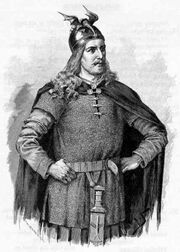
A 19th century illustration of Sven I.
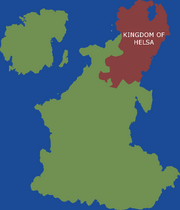
Map showing the approximate boundaries of the Kingdom of Helsa in 1125
From the late seventh century, Isokyria was divided into several chiefdoms and organized tribes which grew from small trading villages established by Norwegian explorers. Historians hesitate to call these polities "kingdoms" as they were generally centered around a shared kinship, had an elective system of succession, and did not claim the right to rule from divine sources. From written accounts, Ulfor, appears to have been one of the more influential chiefs during this period of Isokyrian history. He ruled an area that now covers much of modern-day Fisbae between 914 and 925. A manuscript written by an unknown author, dated around 947, some 22 years after the end of Ulfor's reign, tells how he successfully led his army to repulse a Viking raid, a story which historians doubt is factually accurate.
By the 10th century, some chiefdoms became more hierarchical and more centralized. A feudal system, much like what was practiced in the rest of Europe, developed in these areas. In 1121, Sven I Longblade, who controlled the area Ulfor had two centuries earlier, proclaimed himself to be King of Helsa after successfully assimilating neighboring tribes, establishing the first, true, kingdom in the Isokyrian islands. His reign was tenuous at best and was plagued by competing realms, outside threats, and plots from within his own court. He had six children, four sons and two daughters, with his wife, Hunda. Only two of them would survive past age 24, his son Sven II of Helsa and his daughter Ragna Reiksdottir. His son succeed him upon his death in 1136 but like his father, Sven II had trouble controlling his realm. He was unable to command the respect of his levies and the Kingdom of Helsa fell to rival chiefdoms, the lands being split among the local leaders. The fall of the Helsan kingdom is often to known to historians as the Humbling of Isokyria, as it "Signaled to ambitious men that anyone who is arrogant enough to consider himself a king shall be struck down by the Gods." The Humbling has been discussed in regards to the Nororist Party's rule of Isokyria.
Norman invasion
See also: Norman invasion of Isokyria, Heitvelk, List of Isokyrian chiefs allied with Normans
Since the fall of the Kingdom of Helsa, the Isokyrian islands remained politically fractured among competing chiefdoms, each vying for influence over each other and dominance over the islands. In 1205, the southern tribes, known as the Heitvelk, requested the assistance of the southern Normans in the neighboring British Isles, offering a formal alliance in exchange for guaranteed control over the islands. The Normans agreed and they were invited to invade Isokyria from the south, immediately providing the Heitvelk with enough men to begin invasions of the northern polities. Þórir Svkari led the Heitvelk-Norman armies northward, winning decisive victories and was able to secure half of Helsa under his realm within one year. For his collaboration with the foreign Norman armies, he became known as the Traitor, reflected in his epithet Svkari which means "One who betrays". By 1209, most of the island was under Heitvelk-Norman control. The campaign led to the permanent settlement of Normans in Isokyria, which would later be used as justification for British control of the Isokyrian islands. It also led to a mix and blend of Isokyrian culture and culture from the British Isles.
Russian rule (1592-1705)
Main article: Russian Isokyria
British rule (1705-1920)
Main article: British Isokyria
War of Independence (1920-1923)

Flag of Isokyria during British rule.
Main article: Isokyrian War of Independence
Inspired by movements in Ireland, a large independence movement led by the Party of Isokyrian Republicans (PIR) began to develop. In an effort to keep the peace, negotiations between the PIR leadership and the British government were started in 1919 but quickly broke down. The UK said it would grant independence only if King George V remained Isokyria's head of state. The PIR refused, insisting the country become a fully separate republic. The dispute turned violent after the bombing of the Royal Hufo Police office which killed 6 British police officers. Whether this attack was sanctioned by the PIR or if the bombers acted on their own accord was hotly debated. Whatever the case, the bombing spurred further acts of violence against British authority figures, leading to the imposition of martial law. The British Army was then sent in to restore order but their numbers were stretched thin because of the crisis unfolding in Ireland.
Again following cues from the Irish, guerrilla tactics were employed by the Isokyrians to weaken the British resolve to fight. This style of warfare would continue for three years until the Anglo-Isokyrian Treaty was signed in 1923, recognizing Isokyria's independence as the Republic of Isokyria.
Post-independence government (1924-1931)
Main articles: Republic of Isokyria, Henrik Petyrsson, Congress of Isokyria
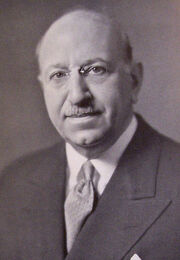
Henrik Petyrsson pictured in 1921.
After Isokyria became an independent state, elections were held for the first time on the island nation, resulting in a legislature nearly equally divided between the right-wing Nationalist & Nordic Coalition (NNC) and the left-wing Social Democratic Union (SDU), Communist Party of Isokyria (CPI), and the Socialist Solidarity Party (SSP). Henrik Petyrsson, a member of the NNC, was elected to lead the new post-independence government as Prime Minister. The government he oversaw was severely weakened, due in part, to the divided legislature, which slowed progress on drafting and ratifying a new constitution. Petyrsson, despite being identified as a moderate, had earned a reputation for being a strongman, and was able to whip the infant Congress of Isokyria into drafting a rudimentary constitution which had provisions outlining the general function of the government, but lacked a comprehensive guarantee of civil liberties. Both the nationalists and socialists objected to the lack of guaranteed rights but bitterly disagreed which rights ought to be secured.
The NNC, previously divided among different conservative and traditionalist factions, was becoming much more united under Nororism, then a new ideology being developed by Christian Robertsson. Petyrsson was skeptical of Roberttson's ideas, believing his social and economic views were too radical. The two men would often have heated debates on the Congress floor and they quickly became each other's biggest rivals. Meanwhile, the left-wing remained divided between the democratic socialists, social democrats, and communists. The NNC successfully deployed agents provocateurs to sow dissent and discord within leftist circles, thus preventing the formation of a left-wing coalition despite the rising influence of Nororism. This gave the nationalists more leverage and they began successfully restoring order to Isokyria, which had become overrun with looters, thieves, rapists, and murderers due to the lack of clear authority. The Isokyrian Police Force, the precursor to the National Police, was established in 1926 and staffed with officers of "Good moral character." This era of reduced crime would not last, however, as the socialist and nationalist sides became increasingly militarized. Both sides began started stockpiling weapons and several politically-motivated acts of violence perpetrated by both sides only exacerbated tensions.
Civil War (1932-1938)
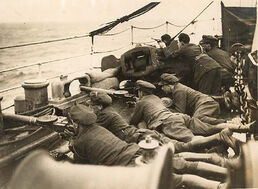
Members of the left-wing forces firing from a makeshift gunboat.
Main article: Isokyrian Civil War
By 1930, the police's ability to keep the general peace was waning and it was becoming clear that war could breakout at any minute. The war is said to have begun with the attack on the Young Socialist Front's headquarters, in which nationalist militants shot and killed 57 socialist and left-wing youths. While retaliation was inevitable, the left was still fractured among different socialist and communist movements (the largest of these being the Isokyrian Revolutionary Front). The right coalesced around Nororism, the ideology created by Christian Robertsson which supported unity of the Isokyrian nation around a strong state and a revival of the country's traditional Nordic culture.
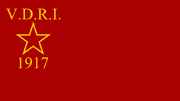
Flag used by communist forces. V.D.R.I. stands for "Volkes Demokratik Republik of Isokir" and the year 1917 is to commemorate the October Revolution.
The Isokyrian Revolutionary Front espoused a Marxist-Leninist ideology, hoping to turn Isokyria into a communist state much like the Soviet Union had become twenty years earlier. The unrecognized People's Democratic Republic of Isokyria was proclaimed and lasted the course of the war until its dissolution.
Nazi Germany supported the nationalist side with limited amounts of monetary assistance, giving them the upper hand early the in the war. Leftist forces managed to hold key cities despite numerous siege attempts by the right, prolonging the war about five years.
Details of the war, particularly the war crimes that were alleged to have been committed by both sides, are hard to come by as the current regime has allowed only restricted access to military documents and accounts, and what information the government does release usually favors the Nororist side. Most of what is known about the conflict are from leaked documents and eyewitness accounts from leftist militants who left the country before the war ended which, according to some historians, still does not provide a satisfactorily neutral line of events.
Robertsson era (1938-1959)
Christian Robertsson in 1914.
After the Nororist victory, Christian Robertsson, who had been an important military leader for the right-wing factions, was elected the first Chairman of the Nororist Party.
He began his time in office by immediately enacting polices designed to transform Isokyria into a Nororist state. Among the first of these policies was entitled Revival of Isokyria's Nordic and Viking Roots aimed at restoring traditional Isokyrian culture which declined during the British rule. He re-introduced the Isokyrian language, adopting the runic elder futhark alphabet, mandating it be taught in schools and that all government documents be written in both English and Isokyrian. While Robertsson was a Protestant, he authorized several programs aimed at restoring the pre-Christian Norse folk religion, establishing state-funded churches and temples that worshiped the old Norse gods.
Social cleansing
In order to protect the infant regime, Robertsson authorized the creation of the Isokyrian Program for National Integrity (IPNI) which was granted a wide range of authorities and duties. Its primary duty, as outlined by Robertsson, was protecting Isokyria from "subversives". Subversives, as Robertsson defined them, were people who "Make it their life mission to destroy our nation, undermine its principles, and advocate destructive and dangerous views and practices meant to dilute our national purity". The program began with a very broad definition of "subversive". Open Marxists, Communists, and even left-wing moderates were immediately culled from the population, either deported or, if their crimes were serious enough, executed. Next, people who were considered genetically inferior were forcibly sterilized. This wing of the IPNI was used more conservatively as Robertsson specifically wanted to avoid introducing any sort of racial bias into the program. Instead, people prone to genetic diseases were the most targeted for removal from the gene pool. Homosexuals were not targeted by the IPNI who instead left that to the country's mental health system as Robertsson did not believe homosexuality was a direct threat to the nation, nor that it was being promoted with the destruction of Isokyria in mind; this program was designed solely to combat perceived immediate threats to the Isokyrian nation. Finally, the program provided incentives for "Model Isokyrians". Women who were considered the "Pinnacle of beauty" were offered government stipends for each child they produced with their husband. The program then covered much of their educational and health costs. The program's effectiveness has been disputed, both from within and outside Isokyria. By Robertsson's retirement, the program had become defunct before being formally dissolved by Robertsson's successor, Emil Ingolfsson in 1960.
Information about the IPNI was, until 2016, very limited and its existence was not proven until the Isokyrian Home Office declassified many documents relating to it. These documents corroborated the accounts of defectors, including former state workers.
Economic reforms, social advocacy, and foreign policy
Robertsson's economic reforms involved establishing a relationship between the state and the worker in order to work towards the betterment of the nation. While officially opposed to capitalism, Robertsson allowed private companies control of some industries, under the condition they put the interests of the nation first. Any company that was seen as placing more importance in profit than Isokyria faced being dissolved and its assets seized by the state. Other sectors, such as banking, were completely nationalized and reorganized as "National Worker Syndicates." Trade policy was made almost entirely protectionist with the notable example of crude oil exports, which are credited with Isokyria's relative wealth.
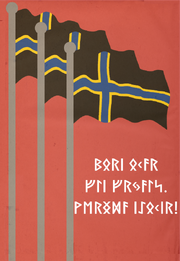
Isokyrian propaganda poster that reads "Our banner flies free. Protect Isokyria!"
Socially, Robertsson advocated a strong moral code and told citizens to be weary of "degenerate" behaviors. Excessive drinking, gambling, drug use, promiscuity, and greed were all considered "degenerate" and were discouraged by the state. Robertsson's attitude towards homosexuality was especially tough, viewing it as a "serious disorder of the mind requiring the most thorough treatment." It is estimated around 10,000 or more homosexuals were forced to undergo therapy to "cure" their "perversion." Robertsson also placed great emphasis on gender roles. Men, who were seen as the defenders of society, were required to serve in the armed forces for 1½ years. Women were prohibited from holding certain jobs and tax incentives were offered to families with more children.
Robertsson's foreign policy consisted of unwavering opposition to the Soviet Union and he garnered large amounts of support from the U.S. as a result. He never showed an interest in joining NATO, however and made no promises to come to Western Europe's defense in the event of a Soviet invasion. While he received support from Nazi Germany during the Civil War, he distanced his government from Hitler's regime as World War II went on, disapproving of the Nazis' racial policies and treatment of the Jews.
"What has occurred in Spain and Isokyria must occur in every nation on earth.
We have discovered Nororism, they have discovered Falangism.
I look forward to witnessing other national epiphanies."
- Christian Robertsson.
After Germany's defeat in World War II, he forged a friendly relationship with Francisco Franco, dictator of Spain at the time. He visited Spain three times during his time as Chairman, applauding the country for also achieving national unity. Franco visited Isokyria once in 1954.
By 1959, Robertsson's health began to decline and he began to feel unfit for service. After some consideration, he resigned his post as Chairman of the Nororist Party, which would set a precedent that has been followed by all successive Chairmen. He lived the remainder of his life in his hometown of Futorprent out of public view. He died on March 6, 1980 due to heart failure.
Ingolfsson era (1959-1964)

Emil Ingolfsson's official party portrait as Chairman.
Ingolfsson took office during a period of tense relations between the Eastern Bloc nations and NATO members. The U-2 incident dashed hopes for a detente and this was compounded by several confrontations between Soviet submarines and Isokyrian warships off the Isokyrian coast. In order to posture the country against Soviet aggression, Ingolfsson increased the military budget and increased the draft term, from one and a half years to two for all able-bodied men aged 18-25. He also ordered the construction of several destroyers and asked the Committee Regarding Defense of the Nation to explore the feasibility of constructing an aircraft carrier.
Ingolfsson also faced trouble within his government. Much of his cabinet was full of party members who were still very loyal to Robertsson and Ingolfsson found it difficult to work with them. Ingolfsson himself harbored some views that starkly differed from Robertsson's. Ingolfsson was an open anti-Semite and wrote several short manuscripts outlining his reasons for detesting the Jews, presenting supposed evidence as to why the Holocaust did not happen or was exaggerated, and proposals for all Jewish persons be expelled from Isokyria. His beliefs severely alienated himself from the Party, which always asserted that Nororism was never a racial movement. They only elected to keep him in office for the time being to ensure stability; protecting the precedent that peaceful, orderly transitions of power would become routine in the island nation even in spite of "minor" ideological differences. Alone and disliked by those who mattered, Ingolfsson had to search for allies within the Nororist party in order to consolidate his power.
Georgist support
He found such allies in the form of the Georgists, a small group of politicians in the Nororist party that silently advocated Georgist economics. The Georgists were economic reformers that wanted to stimulate the economy without straying too far from Nororism's core economic principles. Georgism supports the common ownership of all natural resources but that the workers are entitled to the value they create from the use of these resources. In a way, the Isokyrian economy was, in theory, already structured in a similar fashion as workers owned the country's natural resources by proxy through their syndicates, but the Georgists were dissatisfied with how the economy actually functioned in practice. They acknowledged that most companies that were ostensibly state-owned and worker-managed were in fact run by politically-connected capitalists (better described as corporatists to some political thinkers) who avoided forwarding their profits to the state. They viewed Ingolfsson as a means to implement their economic views as they recognized the weak position he was in although they did not share his views towards the Jews. They approached Ingolfsson and offered him their loyalty in exchange for public support of their Georgist policies. Ingolfsson was skeptical at first as he was not enthusiastic about their economic plans. He was concerned the party could view this as the final straw and oust him for becoming too "un-Nororist" but the Georgists assured him that he could sell their view to the party leadership.
While objection from the party's leadership did not materialize, Ingolfsson still found it difficult to implement Georgist policies. Most proposals he would put forth would be watered down by his colleagues rendering them ineffective. Wealthy, politically-connected, individuals who entrenched themselves in the Isokyrian government mounted a tough resistance to Ingolfsson's changes. The relationship between Ingolffsson and the Georgists would fall apart and Ingolfsson once again found himself politically alone.
1964 Hufo protests and suppression
Main article: 1964 Hufo protests

Officers of the National Police dressed in riot gear attempt to disperse protesters on Hufo University campus by firing tear gas. This photo was smuggled out of the country by a defector and is the only known photo of the protests.
The economy had been in a downturn and was nearing recession and civil unrest was brewing. Underground leftist groups, remnants of those that fought in the civil war, were preparing to launch an insurgency campaign to topple the Nororist government. Previously keeping a low-profile, they openly condemned the government's authoritarian policies and decried the increasing gap between the politically connected party elite and the impoverished blue-collar worker. Hundreds of them were arrested which only invoked feelings of solidarity among the objecting groups.
Tensions reached their peak after protests at Hufo University campus were organized. An estimated 4,000 or more, mostly students, showed up to protest the Nororist Party's grip on the government. The government responded brutally. Ingolfsson demanded all demonstrations be dispersed immediately. Police fired tear gas at the crowds while protesters attempted to mount a non-violent resistance. Ultimately the police were successful in dissolving the demonstrations and thousands were arrested, many of whom charged with treason. An armed rebellion, as originally planned, never materialized. The state has since suppressed discussion of the incident and detains anyone who speaks about it or searches about it online. In modern times, it has been compared to the Tiananmen Square protests.
Anti-Semitic policies and subsequent removal
After the incident in Hufo, Ingolfsson had lost all internal support. In spite of this, and possibly as a final act knowing it would only be a matter of time before he was removed, he issued an executive decree, NCO. 323, that declared that all persons with more than three Jewish grandparents were no longer Isokyrian citizens (intentionally modeled after the Nuremberg Laws of Nazi Germany). The measure was met with intense opposition from the Nororist Party and within only one week of its issuing, the decree was repealed by the National Assembly. Ingolfsson was then removed from office two weeks later, with Dagnae Wilhjamsdottir selected as his successor.
Wilhjalmsdottir era (1964-1989)

Dagnae Wilhjalmsdottir's official Party portrait.
By the time Ingolfsson left office, a surge of feminist thought was sweeping across much of the western world. In response, the National Assembly elected Dagnae Wilhjamsdottir as Chairman, the first woman to hold the office. She launched a public relations campaign aimed at Isokyrian women that not only emphasized their roles as mothers, homemakers, and supporters of their husbands, but encouraged them to study science, math, and technology. Thousands of government positions were opened up to women, particularly in military research and development, which utilized these fields the most. The state also offered scholarships to girls who performed at the top of their class.
Wilhjalmsdottir bolstered the government's socially conservative stances. She ordered a crackdown on illegal pornography distribution as well as prostitution saying "They reduce women to their most superficial aspects: their bodies. They teach our young boys that women are only important for their own pleasure and they totally degrade the important role women play in all of our lives." She mandated stiffer penalties for violating anti-pornography and anti-prostitution laws and created several education programs that aimed to teach young people about the merits of marriage and chastity.
She enacted several economic reforms while in office, including liberalizing trade by reducing tariffs and selling off some previously state-owned companies to private managers and allowing them to conduct business with foreign companies. The economy boomed under her term and despite enacting the first-ever tax reduction, state revenues were at their highest. She directed that a large portion of these funds go to youth programs, especially the girl scouts. State-of-the-art athletic facilities were built and her administration promoted healthy eating among Isokyrian children.
Later in her term, she gained a reputation outside the country for having a complex relationship with her detractors, somewhat relaxing the government's approach to political dissidents while still maintaining a strong regime of obedience and conformity. Protests were still restricted, but more diversity in opinion was allowed into the National Assembly, an unprecedented move. This, however, did not materialize into legally allowing other political parties as some foreign observers had hoped. At 25 years, 8 months, and 15 days, her term remains the longest of any Chairman to date, surpassing Robertsson's 21-year term.
Visit to Moscow
Main article: 1974 Wilhjalmsdottir visit to the Soviet Union
Perhaps her most memorable achievement was the thawing of Isokyrian-Soviet relations. On October 18, 1974, Wilhjamsdottir landed in Moscow greeted by General-Secretary Leonid Brezhnev, becoming the first Isokyrian chairman to visit the communist superpower. The two leaders spoke privately, discussing trade, nuclear weapons, the United States, and the deep cultural past Isokyria shares with Russia. Wilhjamsdottir then delivered a short speech to the Supreme Soviet before embarking on a tour of major Soviet cities such as Leningrad (now Saint Petersburg) and Kiev. The whole visit, which lasted one week, was compared to U.S. President Richard Nixon's visit to the Peoples Republic of China, which occurred only two years prior. It established a rapport between the two nations that continues to this day, withstanding the fall of the Soviet Union and the recent diplomatic crises regarding Ukraine and Crimea.
Isokyrian Oil Workers strike
Main article: 1985 Isokyrian Oil Workers strike
The Isokyrian Oil Workers was a trade union that represented Isokyrians employed at many of the various state and private-owned petroleum companies across the country. In 1985, the labor contract between the IOW and the Isokyrian Government had expired and was up for re-negotiation. The union demanded an increased salary and more comprehensive health and life insurance plans, citing several fatal accidents in the years prior. The government was unwilling to meet these demands due to the decline of domestic production of crude oil by state-owned companies by 13% compared to private-owned companies, and 17% compared to foreign companies, state and private. Negotiations reached a standstill and the union threatened a strike. No labor union representing public employees had ever gone on strike before and there was debate to its legality. The government once again refused and made a counter offer which did not satisfy the IOW. A strike was declared on the morning of April 7, 1985, with 13,000 workers participating.
Wilhjamsdottir initially was unfazed by the strike, promising that production would continue as normal. The government hired several thousand short-term workers in need of work at drastically lower wages and with virtually no benefits. However, these workers quickly became dissatisfied with their new working conditions and some even joined the strike. This forced the government back to the negotiating table.
In the meantime, production of crude oil by Isokyria went to a complete standstill and gas prices across the world went up. In some parts of the United States, which is one of the largest importers of Isokyrian oil, the price of a gallon of gas went from $1.15 to $3.44 in one week.
After six weeks of striking and an estimated $4 billion lost in revenue, the IOW and Isokyrian government came to an agreement and most of the 13,000 striking employees returned to work.
Agnarsson era (1989-2009)

Agnarsson in 2011.
Agnarsson's term began just as communism was collapsing in Europe. Boris Yeltsin became President of the new Russian Federation in 1991 and Agnarsson was enthusiastic to work with him towards strengthening Russo-Isokyrian relations. He and Yelstin signed the Russian and Isokyrian Pact of Friendship in 1993 which, while doing little in effect, was a pivotal moment in the rebuilding of Isokyria's relationship with the Russians.
Agnarsson pledged Isokyria's full support to the United States after the September 11, 2001 attacks by sending 1,500 troops to Afghanistan and 300 to Iraq. This marked the first time that Isokyria was directly involved in any foreign conflict. After both wars initial missions were accomplished, he pulled back forces, supplying the Coalition with medical assistance and intelligence. At home, he made security a prominent issue and took measures to safeguard Isokyria from terrorism. He strengthened Isokyria's tough immigration standards, all but outright denying entry to Arab and Muslim applicants. Firearms, which were allowed under strict controls, were completely banned in the country. National Police arrested hundreds of individuals accused of having terrorist links.
In order to mitigate the costs incurred from this security fortification, Agnarsson abolished conscription in 2005, making the military a full volunteer force. This allowed the government to control the number of new recruits.
The popularization of the Internet presented new challenges to the Nororist Party that the government was slow to react to. Subversive views and discourse could be shared effortlessly, from the comfort of one's home, and without the state's knowledge. Eventually the state caught on to the Internet's potential to create a disunited country and enacted many restrictions citizen's browsing habits, though falling short of outright censorship. It is believed that this brief period of online anarchy allowed a "Silent Attitude" to take shape; a generation of individuals characterized by an attitude of disillusionment with Nororism and the party but who keep their views to themselves, only sharing them with close, trusted friends.
Devolution to Surhor
Representatives from Surhor, a province which has a largest British-Isokyrian minority (45%), began increasing pressure on Agnarrsson to allow for greater autonomy. British-Isokyrians constitute a different economic class; lower-middle to working class, mainly due to discrimination they experienced during the early stages of Isokyrian history post-independence. Politically, they tend to lean towards more liberal forms of Nororism. The vast majority of them also speak English exclusively. All of these reasons were cited in favor of Surhor devolution. Agnarsson conceded and supported the passage of the Surhor Autonomy Act of 2007 which, among other things, gave Surhor's Provincial Council the power to create laws without the consultation or approval of the central government.
Establishment of NordCorp

NordCorp's logo.
Further information: NordCorp
Later in 2005, he authorized the creation of NordCorp, a state-chartered company that was granted a 10-year monopoly in various industries, subject to renewal (most recent being in 2015). It was structured as a conglomeration of all the previously privatized companies the state had sold off over the years. He supported NordCorp's creation by saying "Never before has the worker been given the opportunity to participate in such a diversified work environment." The company is managed by its worker syndicate board which is led by its chairman who is currently Edward Rake, appointed by the Ministry of Labor in 2010.
White era (2009-2016)

Alexander White in 2013
Alexander White took office in 2009 and made repairing the economy devastated by the Great Recession his primary mission. He took a hard stance against large banks, blaming them for causing the recession and he prohibited any foreign investments. He approved a $546 million bailout package to NordCorp to allow them to purchase newly-privatized companies.
European migrant crisis
White's government avoided directly commenting on the migrant crisis that has affected Europe since 2015. While Isokyria is not part of the European Union, it received several asylum requests from migrants seeking shelter from war-torn areas. As of 2016, the government has not yet replied to any of these requests. High-ranking party officials stated in January 2016 that "The [crisis] is none of our concern. We are only concerned about the interests of Isokyria and nothing more." Later statements by the White government clarified that these comments by the party did not necessarily reflect the views of the Chairman.
Terrorism
Following several terrorist attacks in Europe including Paris in November 2015 and Belgium in March 2016, White opted to continue the national security rebuff initiated by Agnarsson. On March 29, 2016, White ordered all non-government Muslims residing in the country to leave within 120 days and surveillance of electronic communications both coming in and out of the country was increased.
Involvement in the war against ISIS
On July 14, 2016, Chairman White announced that Isokyria would be participating in the war against the Islamic State of Iraq and the Levant, also known as ISIS or ISIL, with limited airstrikes on IS targets. White reiterated that there were no plans for ground troops to be sent in. This announcement marked the second time in Isokyria's history that the country has been involved in a foreign conflict.
Frezet2016 protests
Main article: Frezet2016
Beginning in late April 2016, large-scale protests in Hufo and other major cities in Isokyria were organized through social media, primarily on Twitter with the hashtag #Frezet2016. The protests, among other things, were concerned with the ever-increasing amount of authority wielded by the central government, high-level corruption, lack of transparent elections and increasing income inequality. Several thousand arrests were made by police at protest sites but attempts to disperse the demonstrations have been unsuccessful. On May 2, 2016, the Nororist Party of Isokryia stated it would "Look into" possible reforms in order to address concerns raised by the protesters. Chairman White said, among other things, "[Frezet2016] has made it clear that there are issues that need to be addressed and we fully intend to do so."
By summer, most of the original protests had dispersed and interest waned. The National Assembly did, however, pass several resolutions that relaxed restrictions on freedom of the press, allowing journalists permission to report on some government activities without a permit. Many of the protesters that were arrested were also freed without charges.
Coup d'état attempt
Main article: 2016 Isokyrian coup d'état attempt
On July 19, a coup was attempted by a faction of the Isokyrian Army who seized the National Assembly building and took 25 members hostage, including the President of the Assembly, Oskar Leifsson. From there they made their demands, which included the restoration of "Freedoms and liberties the government has ignored for over 70 years" and the resignation of Chairman Alexander White. 10 people were killed in a failed operation that attempted to rescue the hostages and end the crisis. Following this, the Isokyrian Navy pledged its support for the coup. The coup ended in a second, successful, operation that killed the coup's leader, Richard Taumgartner. The Navy was then disbanded for its support of the coup. The Army has taken control of its responsibilities pending a restaffing and restructuring of the Navy.
Resignation
In the political aftermath of the coup attempt, White announced he would resign on July 31, leaving Eydis Stefanic to succeed him.
Stefanic era (2016-present)
Eydis Stefanic took office in the midst of political and social turmoil. Described as a "hardliner" and "traditional Nororist", she has promised to restore and maintain the status-quo, which has dampened hopes for progressive reform.
Almost immediately after assuming the position, Stefanic was placed under intense pressure from foreign sources to orient the country towards progressive reform, despite being politically opposed to such reforms. In late-August 2016, just under a month into her term, she intrigued international news companies when it was announced that she, and her cabinet, had held a closed-door meeting discussing, among other things, "Moving Isokyira into the 21st century, and drafting policies that address the concerns of our allies." This has led some to believe she may be preparing to concede to the pressure and adopt some liberal reforms.
Election of Donald Trump
The administrations of White and Stefanic remained mostly silent on 2016 United States presidential election. Stefanic broke Isokyria's silence on November 9, 2016, when she personally telephoned businessman Donald Trump to congratulate him on his victory over Democratic contender Hillary Clinton. Stefanic stated she was looking forward to working with Trump and said she hoped relations between Isokyria and the United States will be "renewed".
On January 28, 2017, President Trump issued Executive Order "Protecting the Nation from Foreign Terrorist Entry into the United States", also known as the "Trump Muslim Ban", which restricted travel from seven predominately Islamic countries and suspended the admission of Syrian refugees indefinitely. The order, which the White House assured would not affect green card holders, resulted in the detainment and deportation of many individuals from these countries. Isokyria commented on the order, being one of the few countries to formally support it. Stefanic, in a statement given on January 30, said "The President of the United States has taken marvelous action to protect his country from radical Islamic terrorism. The Isokyrian people fully stand by Mr. Trump and the United States in the fight against the Islamic State, and all forms of terrorism".
Stefanic plans to visit the United States, being the first Chairman to do so, in February 2017.
Government

Isokyria is governed as a single-party unitary state and the Isokyrian government has been described as "highly authoritarian." The Nororist Party dominates every aspect of Isokyrian politics as the constitution defines it as the "Sole party to represent the Isokyrian people and nation." They hold all 250 seats in the National Assembly.
Nororism
Main article: Nororism
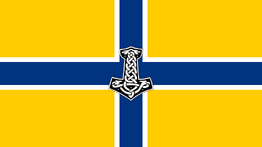
Flag of the Isokyrian Nororist Party, featuring the hammer of the Norse god Thor.

Cover of the Manifesto of Isokyric Thought which outlines the Nororist philosophy.
Nororism is Isokyria's official guiding ideology. It promotes the unity of the Isokyrian nation, opposition to socialism, communism, and capitalism. It teaches that all should take part in the betterment of their nation and to protect it from behaviors considered harmful and degenerate. Nororism originated within the Nationalist and Nordic Coalition and was a major force in uniting the party. Its tenets are summarized in the book entitled Manifesto of Isokyric Thought which is a collection of essays written by Robertsson over his political career. It is divided into five chapters, each about twenty to thirty pages long.
Nororism is often regarded as a fascist ideology or at least, very similar to fascism. The Isokyrian Nororist Party and Robertsson himself have rejected this assertion on various grounds.
Chairman of the Nororist Party
Main article: Chairman of the Isokyrian Nororist Party
The Chairman of the Isokyrian Nororist Party is the country's de facto head of state. The constitution does not actually define a de jure head of state so this role has been fulfilled by every chairman since Robertsson. This has led to the general perception that the state and the Nororist Party are one in the same (i.e. the Party is the state). Because of its unofficial status, the power the office commands is theoretically unlimited but in practice restricted by the National Assembly as well as the Nororist Party's leadership. The general powers of the Chairman include approving measures that have passed the Assembly, staffing the cabinet-level ministries, appointing ambassadors, and so forth. Isokyria is unusual in that it is the head of state that holds nominal power within the government, as opposed to most countries wherein power is vested in the head of government.
The Chairman is elected by the National Assembly. The Chairman's term is indefinite and so far every Chairman to date has left office by resignation. Eydis Stefanic is the current Chairman, who took office on August 1, 2016. She is the second woman to hold the office and the first Chairman who was elected while her predecessor, Alexander White, was still in office.
National Assembly
Main article: Isokyrian National Assembly
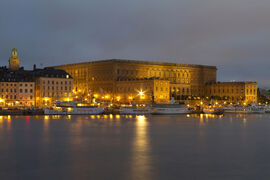
The Kanslairn, the meeting place of the National Assembly.
The National Assembly is the unicameral legislature of Isokyria, consisting of 250 representatives elected to represent each district of each province. The Assembly is led by the President of the Isokyrian National Assembly, who by ex offcio is also Isokyria's head of government. Elected every three years, the President is largely a ceremonial role and has no significant powers. Oskar Liefsson is the current President, since 2014.
The National Assembly also functions as a check on the Chairman's authority. Keeping the approval of the Assembly is essential to being able to govern effectively. The chamber has no authority to totally remove the Chairman from power however. Every four years, the Assembly 'reaffirms' their confidence in the ruling Chairman. This is a rubber stamp measure that has no significance other than reassuring the Chairman's mandate to govern. To date, no Chairman has ever lost a reaffirmation vote, however, Chairman Alexander White did lose a motion of no confidence which led to his resignation in July 2016.
Current cabinet
August 1, 2016 — present
| President of the Assembly | Minister of Foreign Affairs | Minister of Defense | Minister of Finance | Secretary of Home Office |
|---|---|---|---|---|
Oskar Leifsson 
|
Jonas Armannsson
|
Albert Tomasson
|
Viktor Olvirsson
|
Sigrun Agnarsdottir
|
Elections
There are elections for each level of government; national, provincial, and district. In national elections, which are held every four years, citizens vote for representatives to send to the National Assembly. In provincial elections, citizens vote for the provincial council, which can range anywhere from five to twenty members depending on the province, and the Premier, who acts as the province's head of government. The third level of election is district, in which citizens vote for members to sit on their district's council, which, like provincial councils, can vary in membership size.
Judicial
The judicial branch of Isokyria consists of two levels of courts: provincial and district. There is one provincial court for each of Isokyria's nine provinces. Judges that preside over the provincial courts are appointed by the provincial council. District courts are one level below provincial courts and only have jurisdiction within their district. There are around fifty district courts, presided by judges appointed by their district council. There is no national high court responsible for interpreting the Constitution. Therefore, this role falls to the National Assembly.
Law
Isokyria's legal system is predominantly a common law system with civil law elements. There are three levels of courts: district, provincial, and national. All judges are appointed by the Party. According to the Isokyric Code, which is the country's official penal code, there are three types of crimes: offenses against the person, offenses against the nation, and offenses against the state. Crimes against the state are punished the most severely and include treason, defection, and defamation against the Chairman. Crimes against the nation are less severe but still penalized heavily. They include drunkenness, prostitution, gambling, and promoting un-Nororist thought. Crimes against the person describe offenses against other individuals, such as assault, murder, rape, and theft.
Law enforcement is handled by the Isokyrian National Police which in turn is managed by the Isokyrian Home Office, which maintain local offices in every district. As of 2015, there were a reported 21,800 sworn officers.
Administrative divisions
Isokyria is divided into nine provinces and one Special Autonomous Territory which are further divided into districts. Hufo is governed as a city and a province. The mayor of Hufo acts as the de facto premier.
Provinces
Each province is led by a Premier, who is elected by the provincial council. The amount of authority a premier wields can vary wildly from province to province. Some premiers act as dictators second only to the Chairman while others are nothing more than a figurehead within their province. Pvini is the most populous of the provinces with 6.3 million inhabitants. Hufo is the most densely populated with 2.4 million living within an area of 2,957 km2 (1,141 sq mi). Siao is the least populated, at 1.2 million people.
| Province | Flag | Capital | Population (2015 estimate) |
|---|---|---|---|
| Hufo | 
|
Hufo | 2,480,000 |
| Pvini | 
|
Austuf | 6,320,000 |
| Kjotber | 
|
Dyr Peter | 4,635,000 |
| Engklar | 
|
Dyr Alex | 3,548,000 |
| Fisbae | 
|
Fisbae | 3,480,000 |
| Uxaþor | 
|
Uxaþor | 1,949,000 |
| Surhor | 
|
Kuþor | 3,265,000 |
| Siao | 
|
Dyr Mark | 1,232,000 |
| Sauifthor | 
|
Sauifthor | 5,800,000 |
| Faroe | 
|
Tórshavn | 49,000 |
Special status of Surhor and Faroe
Main articles: Surhor, Status of the Faroe Islands in Isokyria
Surhor Province has a special status compared to other provinces due to its high British-Isokyrian population. It was granted devolved powers in 2007 in order to better represent the interests of British-Isokyrians. Its provincial council has the authority to unilaterally create laws that differ from the central government's. Furthermore, laws the central government passes may not necessarily apply to Surhor.
The Faroe Islands are considered a Special Autonomous Territory with their own devolved government. The Council of Faroe is the territory's devolved legislature which is presided over by the First Minister of Faroe, their de facto executive.
Social welfare
Isokyria maintains an extensive welfare state. Education is provided for free to all citizens as is healthcare. All citizens are universally covered by the Isokyrian National Health Serivce (INHS). Financial assistance, such as the Isokyrian Food Relief Program (IFRP), monthly cash assistance, government sponsored employment programs, affordable housing, and energy assistance are available to all low-income families and needy individuals. The government also provides for new families, offering a tax incentive for women expecting their first child and providing a care package to all newborns which include a booklet informing new parents what to expect during their child's first few months, a three-week supply of diapers and baby formula, and a plastic box that can be used as a crib when fitted with appropriate bedding.
Human rights
Isokyria's human rights record is one of the poorest among developed nations which has created concern in the West especially following the end of the Cold War. Rights such as freedom of speech, freedom of assembly, and due process are guaranteed by the constitution but according to defectors, are largely ignored by the authorities. Criticism of the Party can invite surveillance and detainment by police. Citizens looking to organize political demonstrations must obtain a permit which are almost always denied to non-members of the Party. People accused of crimes are generally afforded a poor if not non-existent defense. There is no trial by jury and a defendant's fate is usually decided by one or more judges. Prison conditions are said to be second-rate but are especially worse for political criminals. Emigration is generally not restricted but the government reportedly makes pariahs of the families of expats who speak against the regime.
The United Nations has looked into complaints of human rights abuses committed by the Isokyrian government. A 2011 inquiry stated "[Isokyria] has much to work on and it is recommended steps be taken at an internal level in order to bring the country's human rights record up to par with its western neighbors".
Internet freedom groups say that while the internet is not censored in Isokyria, the government tracks what sites citizens visit. Using an unauthorized site can result in being visited by the police and likely detained indefinitely. The government publishes a list every month detailing what sites are forbidden and encourages citizens to check it often. The vast majority of these sites are pornographic. Most social media sites, including Facebook, are allowed but the state encourages citizens to use the Nororist-approved alternative, Vinhus.
LGBT rights

Demonstrators protesting Isokyria's LGBT policy in Washington, DC.
Main article: LGBT rights in Isokyria
Isokyria has been strongly condemned for its treatment of LGBT persons and some countries, such as Canada, have threatened sanctions over it. According to defectors, being openly gay or engaging in homosexual activity will result in being involuntarily admitted to a psychiatric ward for treatment. This treatment usually involves therapy and medication, though medical experts from outside the country doubt its validity. Chemical castration is also sometimes used for "severe" cases. Patients who refuse to acknowledge that their sexuality is "disordered" are typically jailed until they do. Patients are released if a state-appointed doctor is convinced they have been "rehabilitated" to heterosexuality but are kept under watch for some time to ensure they do not re-offend. Transgender people receive similar treatment.
Upon taking office in 2009, Alexander White responded to concerns over the treatment of LGBT people in Isokyria by saying his government would "review the procedures" currently being used by medical personnel. The Human Rights Campaign stated, however, that "[the] Isokryian government has done little to address the egregious treatment of its LGBTQ+ community." According to official government reports, the number of persons treated for homosexuality each year has been decreasing.
Women's rights
Isokyria's approach to women's rights has been complex. When the Nororist regime was in its infancy, it enforced strict gender roles for both men and women. Women were barred from taking jobs that were deemed too "labor intensive" and discouraged female employment in general, instead promoting an image of a ideal Isokyrian family where the wife stays home and cares for the children while the husband provides. Female sexuality was also heavily restrained. Early propaganda emphasized the supposed value of virginity and girls were often taught that those who were promiscuous would have difficulty finding a husband. However, beyond these social rules, which have been gradually relaxed as the decades passed, women have had the same legal rights as men for most of Isokyria's history. They can hold property, enter into contracts, are able to obtain a no-fault divorce, have a right to education, and have the right to vote. Even during the Robertsson era, the barrier preventing women from entering politics was almost non-existent. As of 2016, there have been two female Chairmen of the Nororist Party and women occupy offices at all levels of government. Of the 250 representatives at the National Assembly, 102 are women.
Reproductive rights groups, however, rank Isokyria poorly. Abortion, while technically legal, is strictly regulated and in effect, only allowed in narrow circumstances. Excessive amounts of red tape surrounding the procedure limits the number of clinics willing to perform abortions.
Extrajudicial killings
The government has been accused of carrying out extrajudicial executions of political dissidents, allegations the government denies. Human rights groups point out numerous cases of journalists and activists dying or disappearing mysteriously and receiving little attention from authorities, even when petitioned by the victim's families.
British-Isokyrians
Historically, British-Isokyrians were at a social disadvantage due to mistrust and resentment towards British people that accumulated during the British colonization of Isokyria. Overtime, social attitudes towards British-Isokyrians became more accepting and in 2009, Alexander White became the first British-Isokyrian to be Chairman of the Isokyrian Nororist Party. In 2016, Eydis Stefanic, another British-Isokyrian, succeeded him. Nevertheless, economically speaking, British-Isokyrians tend to fall in the lower-middle class and discrimination against them continues to this day. While previously endorsed and encouraged the the government, the Nororist Party has since rescinded its earlier prejudice, discouraging forms of discrimination against people with British descent. Still, such discrimination remains legal.
Foreign relations and military
Foreign relations

All the countries Isokyria has diplomatic relations with shown in green. Isokyria shown in black.
Isokyria maintains relations with most countries in the world. It was historically a close ally of the United States, however that relationship has become strained since the end of the Cold War due to concerns surrounding Isokyria's human rights record. It works closely with the European Union. During the Cold War, it was close partner of NATO but has gradually distanced itself from the alliance since the fall of the Soviet Union while still providing its members with intelligence regarding the global War on Terror. It is a member of OPEC, the OECD, and the Nordic Council.
Military
Isokyria's military consists of the Army, the Navy, and the Air Force. In 2015, Isokyria's total forces numbered around 120,000 — a figure that has been decreasing over the decades — the vast majority of which constitute the Army. Isokyria spends less than 1% of its GDP on defense, compared to 5% twenty years prior. The global War on Terror was the first foreign conflict to involve the Isokyrian military, followed by the 2016 Military intervention against ISIL. Conscription, which was imposed on all able-bodied men upon age 18, was repealed in 2005. The military has been fully volunteer since then. The United States is the military's primary foreign supplier.
The Minister of Defense is the executive of the armed forces and the Chairman of the Nororist Party is the de facto commander-in-chief.
Economy
Main article: Economy of Isokyria

Isokyrian oil rigs drilling in the North Atlantic. Oil is an important aspect of the Isokyrian economy.
Isokyria's economy was historically a national syndicalist-oriented system with the state retaining ownership of the most important industries. Workers were organized through syndicates and democratically made business decisions. However over the years, various reforms have been gradually enacted which have significantly liberalized the economy, moving away from the national syndicalist system and towards what some refer to as state capitalism. Economic growth has grown in tandem with liberalization, allowing Isokyria to keep up with its eastern neighbors. This evolution has resulted in an economy that is structured in a way similar to the Peoples Republic of China's. Private property rights have been expanded and foreign as well as domestic companies have found it easier to do business in Isokyria. The state still retains control of some of the more "essential" industries. Crude oil is a major example, with the state controlling 58% of domestic production. The remaining 42% is split among four companies.

Isokyrian one pound note.
NordCorp was created by a state charter in 2005 and has played an important role in the Isokyrian economy. As it is a conglomeration of previously state-owned enterprises, it is the country's largest single employer with around 334,000 employees as of 2014. Its existence has not been without opposition, however. The current Chairman, Eydis Stefanic, has been a vocal opponent of the corporation and has supported its dissolution.
Isokyria is the 5th largest economy in Europe with a GDP of $1.885 trillion in 2016, just below Italy, France, the United Kingdom, and Germany. The production of crude oil has, for the better part of Isokyria's history, played a central role in the country's economy and still constitutes 63% of Isokyria's exports. This figure has been declining, however, as the rise of the internet has given way to a blooming technological sector. Kostside, Sauifþor, which is home to hundreds of start-ups involved in software and hardware production, has been described as "Isokyria's Silicon Valley". Isokyria's human development index is 28th in the world at 0.874. Isokyria has one of the highest Gini coefficients in Europe at 48.3, indicating that income inequality is a significant issue.
The United States, Canada, the United Kingdom, Germany, France, Japan and the European Union are Isokyria's most important trading partners. Isokyria was a founding member of the EFTA when it was established in 1960. Full membership into the European Union has been the subject of some national discussion. Supporters of EU entry argue it would give Isokyria greater access to the free movement of goods and provide greater economic stability, which could prove vital for a nation reliant on violate oil markets. Opponents to EU entry argue Isokyria would be required to surrender sovereignty and would not be adequately represented in the capital of Brussels. The Nororist Party does not have an official position on Isokyrian accession to the EU. There is strong opposition to Isokyrian membership from within the EU itself. Countries such as the United Kingdom and Sweden have said they will block any application to join from Isokyria, citing Isokyria's poor human rights record.
Isokyria's currency is the Isokyrian pound which is issued by the Isokyrian National Bank. It is the ninth most traded currency in the world.
Science and technology
Isokyria is a major contributor to the European Space Agency and maintains its own space program. The Isokyrian Extraterrestrial Exploration Agency (IEEA) has sent over 100 people to space, conducted over five-hundred missions, and has partnered with several other national space programs including the United States, Japan, Russia, and China as well as private companies such as SpaceX. Space exploration has spawned countless scientific and technological advancements for Isokyria and has one of the highest returns on investment; it is estimated that for every US$1 the Isokyrian government spends on space exploration, it generates US$5 in economic activity.
A total of US$58 billion was spent by the private sector in 2016 towards research and development of various technologies, over 67% of these relating to telecommunications. The government invests close to US$5 billion every year in the form of research grants to its higher education facilities.
Isokyria has extensive internet connection with a penetration rate of 89% in 2015. Its primary internet providers are IsoCom, Singular, and Mattis.
Second economy
Despite Isokyria's economic liberalization, foreign analysts have written about Isokyria's "second economy" which comprises economic activity that occurs outside the state-enforced parameters. Much of this activity occurs on the cusp of the 'white' and 'black' markets and some economists say it makes up as much as a third of the Isokyrian economy. It includes unauthorized employment arrangements and the sale of forbidden products such as certain liquors, drugs, pornography and weapons. In the 21st century, much of this activity has moved online in spite of thorough government monitoring. Users looking to purchase illicit products often use software that prevents tracking or sites that the state is unaware about that quickly move to a new domain as soon as authorities become privy to their illegal activities.
Geography, environment, and climate
Isokyria consists of two primary islands and several smaller islands. Helsa is the 11th largest island in the world and is the most populous of the Isokyrian islands. Immediately to the west is Aslo and in between them is Miljor, the smallest of the islands. Further east is the Faroe Islands which is an archipelago in the Norwegian Sea. In total, Isokyria has an area of 249,796 km2 (96,447 sq mi), the 77th largest country in the world.
Isokyria is located between 60° north of the equator. Greenland and the British Isles are the nearest landmasses to the northwest and south, respectively.
Topography
Mount Suljao is the highest point at 5,993 feet. It is an active volcano, the last recorded eruption being in 1785. Geothermal activity occurs elsewhere across the country contributing a significant share of Isokyria's energy production, second only to crude oil.
Flora and fauna
Isokyria is home to thousands of plant and animal species, about 5,400 of which are unique to the country. Well-known animal species species include the Isokyrian black bull (Bos taurus), the white moose (Alces alces alba), and the arctic fox (Vulpes lagopus).
Demographics
In 2015, Isokyria's population was recorded as 32,619,547. 84% of the population identified as being 'Isokyrian', 9% identifying as 'British-Isokyrian', 5% identifying as 'Russian-Isokyrian', and the remaining 2% belonging to other Europeans. English and Isokyrian are the primary languages and the nation is officially bilingual. Russian is a recognized minority language.
Religion
71% of Isokyrians identify as Christian and of those, 81% are members of the Church of Isokyria, the Lutheran state church. The remaining 19% comprise of Catholics and members of other Christian denominations. 28% of Isokyrians identified as atheist or non-religious and the other 1% consisting of religions such as Judaism and Islam. A great portion of Isokyrians say that while they are Christian, they occasionally partake in ceremonies dedicated to revering the Norse gods. Participation in Norse pre-Christian folk religion was upstarted by Christian Robertsson as part of his cultural revival program.
Religiosity among Isokyrians has been decreasing. While the rates of people who identify as members of a particular religion have stayed consistent through the years, fewer people actively participate in their faiths. The rate of people who said they attend services at least once a week has dropped by 32% over twenty years. In 1993, the rate of people who agreed with the statement "Religion is very important in my life" was 55% compared to 31% in 2015.
Social structures
In 2015 there were a recorded 1,643,002 households in Isokyria ("household" being defined as a parent and one or more child under 18 living in the same home). Among these households, 69% were led by married couples, 21% were led by a single-parent, and the remaining 10% were jointed families (that is, one of the parents is divorced or widowed and re-married to another person who is not the parent of at least one of the children). Among single-parent households, 89% were led by the mother, 75% had been married prior.
Divorce rates in Isokyria are low compared to other developed nations due to the government's promotion of the institution and the difficulty of obtaining a divorce. However, in following similar trends in other developed countries, rates of new marriages have been declining and modern couples have opted to simply co-habitating. The government's attempts at incentivizing marriage have seen limited success.
Immigration
Isokyria's immigration policy is very strict, using a system which assigns points to an individual based on several factors including education, specialized skills, prior employment, and proficiency in English (or Isokyrian). If approved, the government issues a work-visa which allows them to live in the country for two years and can be renewed if certain criteria are met. Citizenship is harder to obtain and the vast majority (over 80%) of foreign workers do not pursue it. Indeed, it has been reported by The Guardian that foreign workers wishing to marry a native Isokyrian often find it easier to simply move their spouse back to their country rather than attempt to navigate the citizenship process.
In 2015, Isokyria accepted 2,500 foreigners for specialized work, 78% of them entering tech-related or engineering jobs. Of these workers, 2,075 were from Western Europe and 421 were from the United States. Only four were not from either places. The government says it hopes to expand its horizons and accept more workers from Asian nations such as Japan and China. To this end, it has employed several advertising campaigns in those countries encouraging young workers to consider Isokyria as an employment opportunity. In 2016, its specialized work immigration goal was reported to be 3,300, a 32% increase from 2015's figure.
Education
The Ministry of Education manages all schools in the country and sets educational standards they are all expected to abide by. Day-to-day administration of schools is handled by each of the province's several districts. Every district has at least one primary school and one secondary school. Parents have the option of sending their children to pre-school before the compulsory age of 6. Children attend primary school for six years and then attend secondary school for another six years before moving on to higher education. Private schools and homeschooling are not allowed. The University of Hufo is the largest higher education institute in the country.
Testing of Isokyrian students puts them at or near-average when compared to other developed nations. 77% of Isokyrians aged between 18 and 35 have earned a high school diploma or equivalent.
The Isokyrian government spent the equivalent of $4.5 billion on education in 2015. In 2016, that figure is expected to rise to surpass $5 billion.
Culture
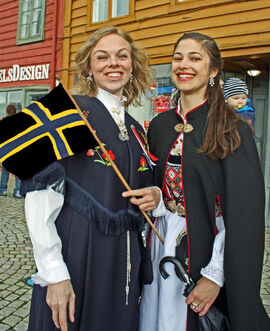
Two Isokryian girls wearing traditional costume while holding an Isokyrian flag.
Isokyria's culture is the culmination of over one thousand years of Nordic, Russian, and British influence. Preserving and promoting Isokyrian culture and history has been the government's top priority since the establishment of the Nororist regime. Over ₤170 billion was spent in 2015 towards this goal, nearly a third of which was put into Isokyria's libraries and museums. The Isokyrian language has been given special attention which is reflected in linguistic demographics. As of 2015, over 40% of Isokyrians said they speak Isokyrian as their first language. That percentage is expected to surpass 50% in 2025. Funds have also been allocated to preserving Isokyria's natural history and wildlife.
Nationalism is a prominent attitude among Isokyrians. Isokyrians generally have an intense devotion to their country and express sincere concern for its welfare. Something of a personality cult surrounds the country's founder, Christian Robertsson though some defectors say this is largely perpetuated by the government and that few Isokyrians actually hold such a high level of admiration that the government projects.
Religion
Isokyrian is a predominantly protestant country with a sizable Catholic minority. As in most developed countries, religion's role in the lives of Isokyrians has been decreasing. Nevertheless, Norse folk religion has found a place in Isokyrian society. In 1955, the state funded the construction of numerous temples and churches dedicated to Norse gods such as Thor and Odin. These churches draw in a diverse array of participation from both Protestant and Catholic citizens.
Literature
Many well-known Isokyrian authors have been inspired by British works. Nororist philosophy has also influenced works of fiction.
Music
Main article: Music of Isokyria

Josephine Black is a rising Isokyrian pop star.
Isokyrian music is a unique mix of traditional Nordic folk tunes and influences from British musicians. Isokyrian music has recently acquired its own identity and distinct style.

"Modern Past", a popular isowave album by artist Goldentrash.
Vaporwave music has developed a prominent scene in Isokyria. 80s-style aesthetics and remixing of popular songs from that era have become a recent furor in the past year, creating a subgenre within the vaporwave scene, called Isowave. Common elements found in Isowave music are a certain aura of melancholy, pseudo-philosophical sayings (e.g. "What you seek is what you are"), incorporation of classical art, and the use of full width (full width) text.
Cinema
Isokyria has large acting scene and film has played a significant role in shaping Isokyrian popular culture. Films such as The Great Isokyrian and My House, My Wife, My Life are among the highest grossing in the country. Humor is a great example of British cultural influence. Acts such as Monty Python have found a large following in the country and Isokyrian comedians have sought to emulate their British counterparts.
Cuisine
Isokyrian cuisine is based primarily on fish, beef, dairy, and vegetables. For centuries, Isokyrians have developed unique ways of combining milk and fish as seen in fisikolt, a classic Isokyrian dish. Salt, as in most cultures, is a staple in Isokyria and is vital to the preparation of thousands of dishes. Isokyrian cows yield a type of beef with a flavor unlike anything else in the world. Steak made with Isokyrian cows is called Isokyrian-style.
After the colonization of the New World and the subsequent return of various vegetables including tomatoes and potatoes, Isokyrian cuisine has expanded far beyond its traditional realm.
Sports
The government has fostered and promoted a healthy admiration for sports in Isokyria. Soccer (football) is the most popular sport but other games such as ice hockey and skiing are popular pastimes. Isokyria has participated in every Winter Olympic Games, winning a total of 57 gold medals. Isokyria has also participated in almost every summer Olympic Games, except for the 1980 Olympics which it, along with other allies of the United States, boycotted in protest of the Soviet invasion of Afghanistan.
Symbols
Main articles: Flag of Isokyria, Coat of Arms of Isokyria, Sybilla

Sybilla, Lady of the Isokyrians and the Nordics c.1898.
The flag of Isokyria is the country's primary symbol. Adopted in 1938, it is a yellow-frimbriated blue cross on a black field, similar to other Nordic flags. The government has spent a great amount of effort promoting the flag among the general public. It is seen on every government building and many private homes.
The coat of arms is similar to the flag: a sable escutcheon charged with an azure cross, fimbriated or supported by two bulls argent. Below is the motto of Isokyria, "KET ANDER ELS ISOKIR", which in English means "None other than Isokyria".
The bull is the most common animal representation of Isokyria and was featured on the pre-independence flag. Sybilla is the human personification of the country. Typically depicted as a beautiful woman with long, blonde hair, she has been the subject of many stories, legends, songs, and myths, which paint an elaborate picture of the character with a distinct personality; kind, caring, and loving but wracked by flaws of impulsivity and distrust in other humans. Even to this day, modern artists incorporate her into their works, often as a depressed or confused woman, reflecting the recent social disturbance Isokyria has experienced in the past decade.









